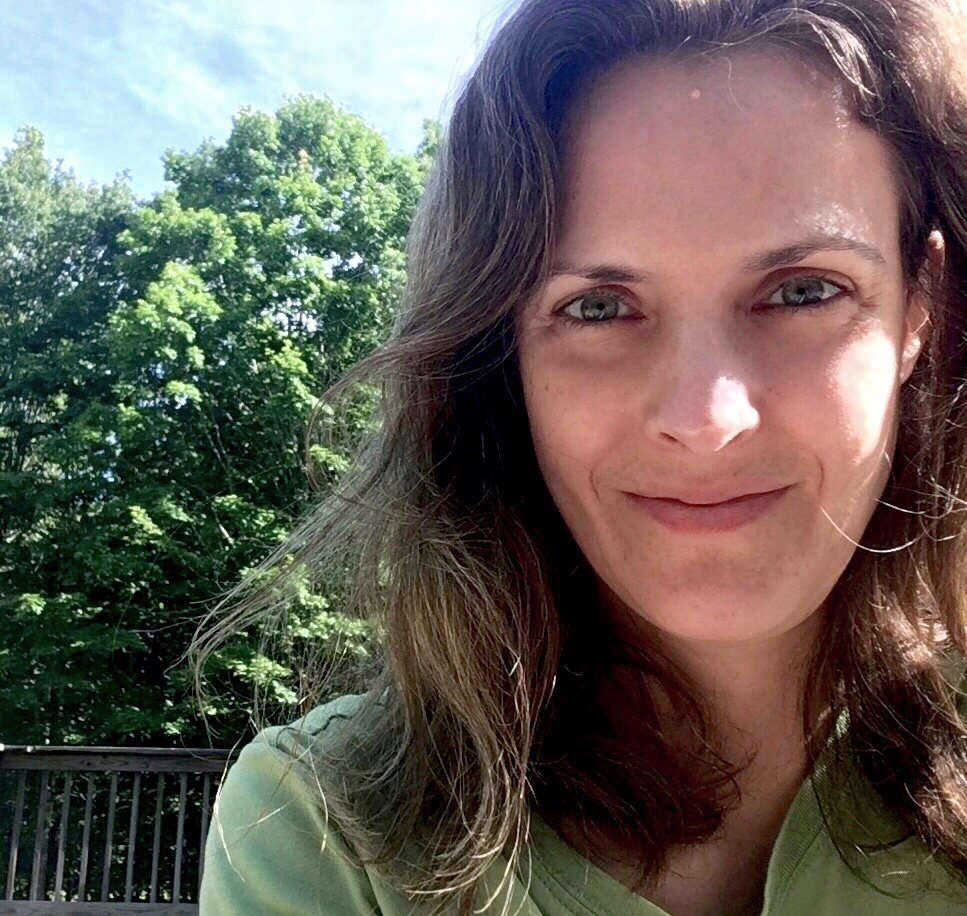ISSN: 1941-4137
POETRY THAT ENACTS THE ARTISTIC AND CREATIVE PURITY OF GLASS
POETRY THAT ENACTS THE ARTISTIC AND CREATIVE PURITY OF GLASS

Michelle Menting's most recent poetry collection is Leaves Surface Like Skin (Terrapin Books). Her poetry and micro-nonfictions have appeared or are forthcoming in American Life in Poetry, Verse Daily, New South, Cimarron Review, and New Delta Review, among other places. The recipient of scholarships and awards from Sewanee, Bread Loaf, the National Park Service, and other conferences and residencies, she lives in Maine and teaches at the University of Southern Maine.
Pavement
Fat evening of summer, we walked,
my sister and I,
the new blacktop of her road,
after the earth
of that same road, a logging road,
becomes sealed, civil, easy
with tarred petroleum.
There we heard a chirping
coming from the thicket
— those grasping thorns
that guard berries before berries.
The sound was a trill on repeat.
An offspring's noise. Some baby's cry.
Raccoons, two of them,
just weeks old, a few months, maybe.
Motherless, for sure.
Sometimes they come back, the moms,
my sister said.
Sometimes they leave to ward off danger,
to tempt it farther
into the woods, away from the kits.
And sometimes they appear
as lumps in the road a quarter mile down.
We walked, my sister and I.
We looked up the blacktop and back
to the dirt, the brambled
ditch. The chirping grew louder.
The kits had scrambled
up the blacktop, claws clambering.
How could something so small
hold so much trust within its tiny heart?
One baby, then the other,
the two of them following the two of us
as we searched for their mother.
We decided to wait. To let the babies wait.
To see if their mother would return
before taking a cat carrier full of ringtails to wildlife rescue.
The trilling continued.
We led the kits back towards the woods,
past the brambles, back to their tree.
The next morning, the trilling again,
but lighter, slighter, and only single.
He was still there — near the thicket, that oak tree —
one of the kits.
But to the side of the road, maybe ten feet up,
his sibling, the one not spared.
The body intact, curled, so trusting.
The head dented and sloped
as if struck by intentional impact.
Evidence of tire tracks swerving
needlessly, purposefully, were grooved
into the earth.
Sometimes they aim. My sister once said this
or I once said this. I don't remember.
It happens so often. What does it mean
when repetition makes memories fade
rather than tattoos them forever into your mind?
With grapes and kibble, we encouraged
the trilling kit into the carrier. We placed
the plastic cage in my sister's Honda.
We closed the door on his hungry cries,
and we walked back
along the road to scoop the dead kit
into the gallon ice cream bucket
we used for picking berries. We'd bury her later
beneath spruce and hemlock,
cinnamon ferns. Away from pavement.
A couple summers ago, I visited my sister in northern Wisconsin, not far from the Upper Michigan border. She lives near logging roads, national forests, and county-owned land. She lives near woods that are still full of wolves, bears, bobcats, and porcupines (thought their numbers are dwindling due to deforestation and development, and sometimes what is deemed "wildlife management"). Although the paved section of her road turns into dirt, in summer, traffic is high and often reckless: people take trucks and go "mudding" on the forest roads, or race beneath the pines into the wee hours. The noise and the ruts created from these heavy vehicles is annoying, but the real damage is to the wildlife, especially whatever creatures need to traverse the road. My sister and I came across two raccoon kits and, upon first discovering them, made the decision not to interfere in case the momma was just off in the woods and planned to return. We waited until the momma raccoon's return seemed unlikely, but by then one of the kits was hit by a vehicle. It made me angry on several levels. Of course I didn't want to interfere too soon and disrupt wildlife, but by waiting too long, humans disrupted wildlife anyway.
Glass: A Journal of Poetry is published monthly by Glass Poetry Press.
All contents © the author.
All contents © the author.





